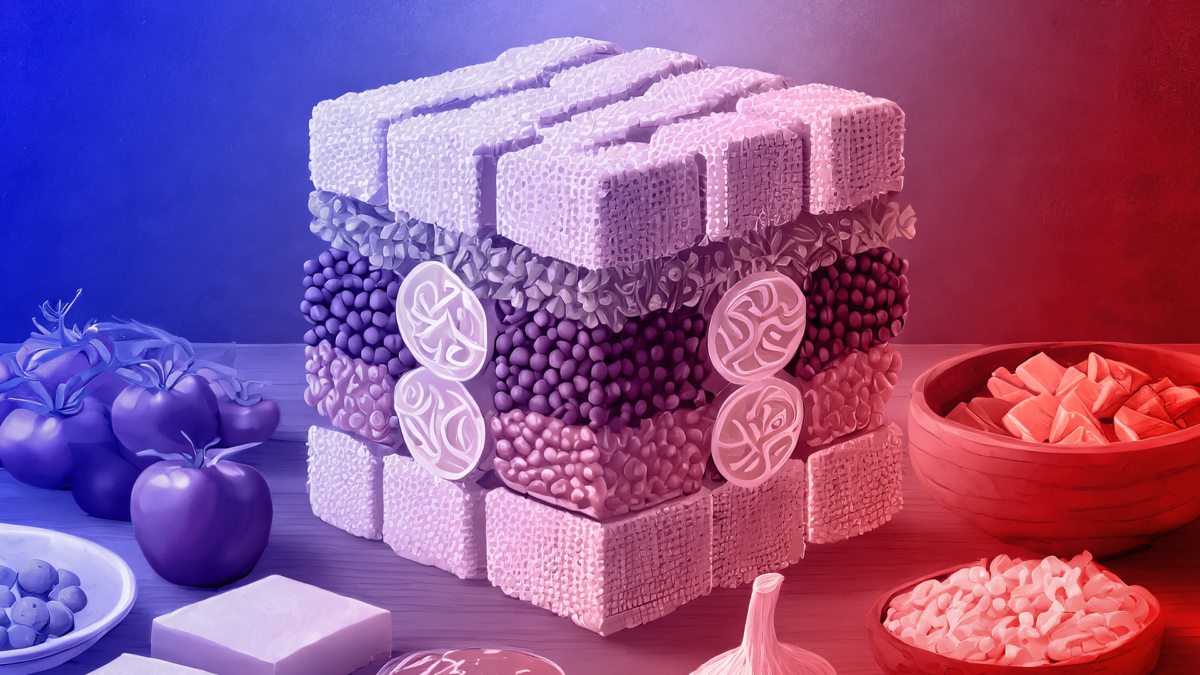Maximum transparency: blockchain in the food industry
The blockchain principle is one of the major digital innovations of our time. And it really does have revolutionary potential – for example in the food industry, where it can improve transparency, increase safety, and open new doors.

Blockchain – a game changer for the food industry?
Artificial intelligence isn’t the only technology causing a sensation and shaking up a wide range of industries: blockchain is also making its mark, albeit more in the background.
We recently wrote about the enormous potential of decentralized data blocks in marketing, but blockchain’s immense power is also unfolding in other, much more day-to-day areas. A prime example is fast-moving consumer goods (FMCGs), a segment that involves the production and sale of groceries and other everyday items. In the FMCG sector, blockchain is sparking a real revolution. The technology is increasingly attracting attention for positively transforming the food trade and supply chains.
It’s all about sustainability and trust
Like no other technology before it, blockchain is empowering the FMCG sector to create maximum transparency. For food producers and retailers, that’s an extremely valuable success factor that should be taken seriously. After all, sustainability aspects, such as environmentally compatible and climate-friendly work processes and fair conditions for producers in the countries of origin, are currently a top priority for consumers – and rightly so. However, it isn’t easy for companies in the food sector to keep track of their supply chains and value-added processes from end to end, especially if they’re operating on a global scale. Not to mention that an increasing number of conscious consumers are now able to discern what’s actually in front of them on the shelf and whether the information on the packaging is actually true.
Reading tip: We’ve put together a compact guide that walks you through everything you need to know about blockchain technology and how to implement it in your day-to-day marketing tasks. Download the paper “Blockchain in marketing – the principle and potential” for free here.
Information, honesty, and traceability are aspects that play an extremely important role in the food industry today and are being demanded by consumers and across large parts of the political community. However, corresponding political solutions, such as the recently postponed EU supply chain law, are not bringing economic players any further. Critics feel there is too much bureaucracy involved in bringing legal regulations into force. In contrast, blockchain technology offers a future-proof solution.
Blockchain in the supply chain – for true transparency
Blockchain is a technically ultra-secure, tamperproof, and traceable system, thus providing an unprecedented level of transparency in the food industry. In the form of transactions, which document every step of a value-added process, companies can map their supply chain from start to finish using verified information. That spans the cultivation, processing, storage, and distribution of food. The blockchain may contain information about an item’s origin, fair working conditions, the parties involved, greenhouse gas emissions, product quality, and more. The data in the blockchain can be accessed at any time and from any location. Even when many different parties are involved in one particular supply chain, the veracity of the information is ensured at all times due to the technology’s decentralized nature. Details regarding production, all logistical processes, and sales can be recorded in the blockchain – data block by data block.
Blockchain in the food industry: huge practical advantages
For companies in the food sector, blockchain is a completely novel option for making their processes transparent and demonstrating their corporate commitment.
- For example, they can print QR codes on product packaging that allow consumers to view secure information about the supply chain via the blockchain system.
- This traceability can also help manufacturers identify the source of defective products. That can be especially crucial when the origin of a food item needs to be determined quickly because consumers have fallen ill.
- All steps of a supply chain have to be documented securely, including all the parties involved in the process. With that in mind, blockchain can also be an effective tool for combating corruption and food fraud.
- What’s more, blockchain acts as a catalyst for digitalizing farms in emerging and developing countries, where data has mainly been recorded on paper until now, if at all – particularly in the case of small businesses.
Blockchain is already being leveraged in the food sector
Introducing a blockchain-based system is challenging for companies in the food industry. Not only do they have to overcome technical hurdles, but they also have to consider aspects relating to data protection and incorporate them on a practical level. Countless examples prove it’s possible.
For years now, companies have been pioneering the use of blockchain in the food industry. One example is the French multinational retail group Auchan, which introduced a blockchain concept for distribution processes in its supply chains back in 2018. Its blockchain now makes every step of the supply chain transparent – from vegetable harvesting to shipping. Another example is Oxfam. The development organization has been implementing a blockchain-based trading platform for some years now to optimize the supply chain of rice grown in Cambodia. A number of software solutions specifically designed for supply chains and trading processes have now also caught on in the food industry. These include the track-and-trace platform offered by the auditing firm KPMG, which allows companies to inform their end consumers about where their goods came from and how they were produced.
Technology – it takes trust to build trust
When thinking about blockchain’s possible uses, the first thing that probably comes to mind is cryptocurrencies. However, the technology also offers vast potential in lots of other areas, as demonstrated by the increase in transparency and food safety in the FMCG sector, for example. There, blockchain technology is gradually creating a new generation of supply processes, but it can only do that if the information documented in the blockchain and its data blocks is actually correct. And for that, there needs to be a relationship of trust between producers, suppliers, and retailers. Only then can transparency be ensured at every stage.
Do you want to find out more about blockchain technology? In our stories, we present the latest Web3 and blockchain solutions and concepts. And you’ll also learn plenty more intriguing facts at DMEXCO 2024, so be sure to get your ticket early!





